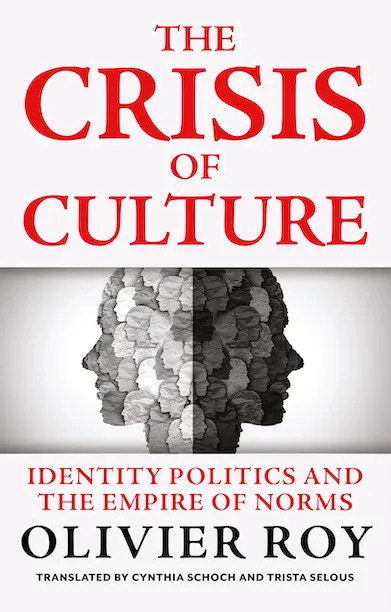This week, I’ve been reading Olivier Roy’s extremely erudite recent book, The Crisis of Culture: Identity Politics and the Empire of Norms. Roy draws widely on recent work from across the political spectrum, lending his thought an eminently Compact-like character. Steering clear of the by-now-familiar “you started it!”; “no you!” yo-yo of accusation and blame, where both parties take turns to shrug or indict, Roy gets to the root of the question of whether there is “a profound crisis in the notion of culture itself.”
Roy notes the profound explosion of bureaucracy, regulations, and proscriptions that have come into their own in the internet age: the “internet miracle,” he writes, has turned us into “our own bureaucrats, petty fault-finders of ourselves and others.” He has a quick and lively turn of mind, noting in passing, for example, that “#MeToo is not a new puritanism, but an attempt to diminish the contradiction inherent in the principle of freedom.” Roy argues that the cultural imaginary is in crisis, and that this crisis is “taking the form of a deculturation that is not followed by an acculturation.” Roy described how previously dominant cultures are also in crisis, which is why everybody feels like the underdog.
There are many more points in The Crisis of Culture that are worth paying attention to—about the notion of the canon, for example—of communication without cultural reference, what Roy calls “coding,” the destruction of privacy, the dominance of taxonomies, and much else. Roy’s critique of liberalism as the promotion of individual desire as the highest good (but in the absence of value itself) will be familiar to Compact readers, and to anyone who had read Alasdair MacIntyre, Patrick Deneen & Co., but Roy has a deep and useful take on our current predicament. The good news, he writes, is that “it is up to people to take charge of their own lives.”
Latest pieces in Compact
A bumper week for the magazine! We began with Kant’s 300th birthday, as discussed by Slavoj Žižek. Žižek brings in Lacan, evil, sadism, populism, and the dark question of whether “the Nazis’ concentration camps and their mode of killing—as a neutral business—[are] the inherent terminus of the enlightened insistence on the autonomy of reason?”
We then published two pieces that deal subtly and thoughtfully with issues around motherhood, marriage, and the economics of reproduction. Unlike much online discussion of women and men, which tends towards gross and unhelpful generalizations if not outright condemnation of one sex or the other, our columnists Leila Mechoui and Justin Vassallo take a dialectical and materialist approach.
In her review of Lisa Selin Davis’s recent Housewife: Why Women Still Do It All and What to Do Instead, Mechoui argues that: “Whether it be exhaustion and overextension for the working mother, or financial risk for the stay-at-home mother, all of the paths available to a woman in today’s world seem perilous. Her success in the professional or domestic domain rests in large part, in the end, on the quality of her spouse and marriage.” Thus the question of virtue and roles rears its head: what might it mean to be a good husband or a good wife, and a good parent? But the economic aspect can be fully detached from the moral one. As Mechoui notes: “State remedies to women’s modern predicament only indirectly include men as a group of taxpayers.”
Justin Vassallo’s piece takes up the material question in his piece on the introduction of Baby Bonds, arguing that welfare economics are no longer as taboo as they used to be: “From intensifying bipartisan support to reinstate an expanded child tax credit to the spread of municipal basic-income trials, cash grants of one variety or another are now seen by more and more of our political class as a legitimate tool to fight poverty.”
Next we published Pedrito Cambrão on “The Mirage of African Independence.” Cambrão argues that the end of formal Portuguese imperialism in Africa “didn’t change the fact that a lack of democracy, the use of force, and political intolerance remain deeply entrenched in a group of nations that suffer the effects not only of colonization, but colonization by a poor and marginal European country.”
John B. Judis wrote a stirring piece regarding TikTok, a platform never far from the news. Making a “trade-hawk” case, Judis argues that, rather than an issue of free speech, the point is one of non-reciprocal markets: “If TikTok disappears, kids can find other platforms on which to circulate silly videos. It’s about the right of a Chinese business to sell its services in the United States when China doesn’t allow comparable American businesses to sell their services there.”
Our Latin America columnist Juan David Rojas covered recent events in Ecuador, where Daniel Noboa’s administration has, Rojas suggests, “gone to great lengths to emulate the methods of El Salvador’s Nayib Bukele.” Rojas argues that Noboa’s high approval ratings and referendum win suggest his stratgey is paying off. However, “it remains to be seen whether Noboa can decisively defeat the gangs, as was achieved in El Salvador.”
This week saw the overturning of Harvey Weinstein’s conviction in the Court of Appeals. Compact founding Editor Matthew Schmitz, who, in 2021, wrote the decisive piece on the original prosecution and trial, was vindicated in his analysis of the proceedings. In his follow-up this week, “Weinstein Gets Due Process, Biden Guts It,” Schmitz argued that “the broader culture may be moving on from various woke pieties, but the apparatus of the Democratic Party isn’t. This apparatus will persist even if the Democrats lose the presidency.” Schmitz notes that this attitude “is entrenched in law schools, which are training lawyers in legal perspectives that disparage due process as an impediment to the righting of historical wrongs.”
To round off the week, we published Daniel McCarthy on Speaker Mike Johnson. McCarthy argues, “The attitude of Johnson and the GOP minority that voted with him is unmistakably similar to the attitude that liberal Democrats have toward domestic spending: Every good cause, from education to medicine, must be supported with more funding, regardless of whether the specific programs receiving support do what they are supposed to accomplish.”
Our weekend read—rather topically, given events at Columbia and other American university campuses—is Greg Conti on the university. Conti notes, among may other points that “there is nothing distinctly liberal about defending universities, nor anything distinctly conservative about attacking them.” Let’s see how the politics of the contemporary campus plays out over the next few weeks.
Nina Recommends
As Compact critic Adam Lehrer noted on X, Baby Reindeer (Netflix) “is a brilliant and supremely honest show. One could accuse Richard Gadd of being a narcissistic over-sharer, which he is; but this story is too traumatizing and fucking weird that I can't imagine being an artist and not using it. It's superb. Sexual confusion, alienation, fear of failure, the lengths someone will go to for recognition and fame in a cultural marketplace, and a revelation that might be shocking to the average Netflix viewer: men suffer too.”
Richard Gadd stars as himself in a bleak thinly-fictionalized reenactment of his life a decade ago as a wannabe comedian struggling to make his way in a cruel and relentless London. Oscillating between supreme optimism, sublime innocence and a seemingly never-ending capacity for self-humiliation, Gadd bounces from one messed-up situation to the next, often the victim but never quite fully able to disentangle his own complicity from the mad and bad behaviour of others.
Given that Gadd is very much drawing on his own life—to the extent that he has had to ask viewers not to investigate who his stalker might be in real life—one has to ask: is appearing so proximately in a remake of violent and disturbing encounters with others on the basis of one’s own biography an form of aversion therapy, repetition compulsion, catharsis or even…revenge?
The fact that it could be a combination of all of these only adds to the unsettling qualities of the performance. As does the realization that Gadd would not have written this fine and already very successful show were it not for his troubling (let us not say traumatic, as we are perhaps supposed to) experiences, the question of how we are all shaped, or even redeemed, by the violence and madness of those others who enter (and sometimes exit) our lives is left hanging as a question for us all.











Baby Reindeer is a really great show and I appreciate your point - too weird not to use. As for the point that men suffer too, I think it's a great example of how a man who does not learn to be honest and communicate "No!" in a clear and uncompromising way will gets into heaps of trouble.
I am super new to this substack, the author, and Compact - and feel like a grandma on the Internet. If I was interested in that article about motherhood and economics, where can I find it?